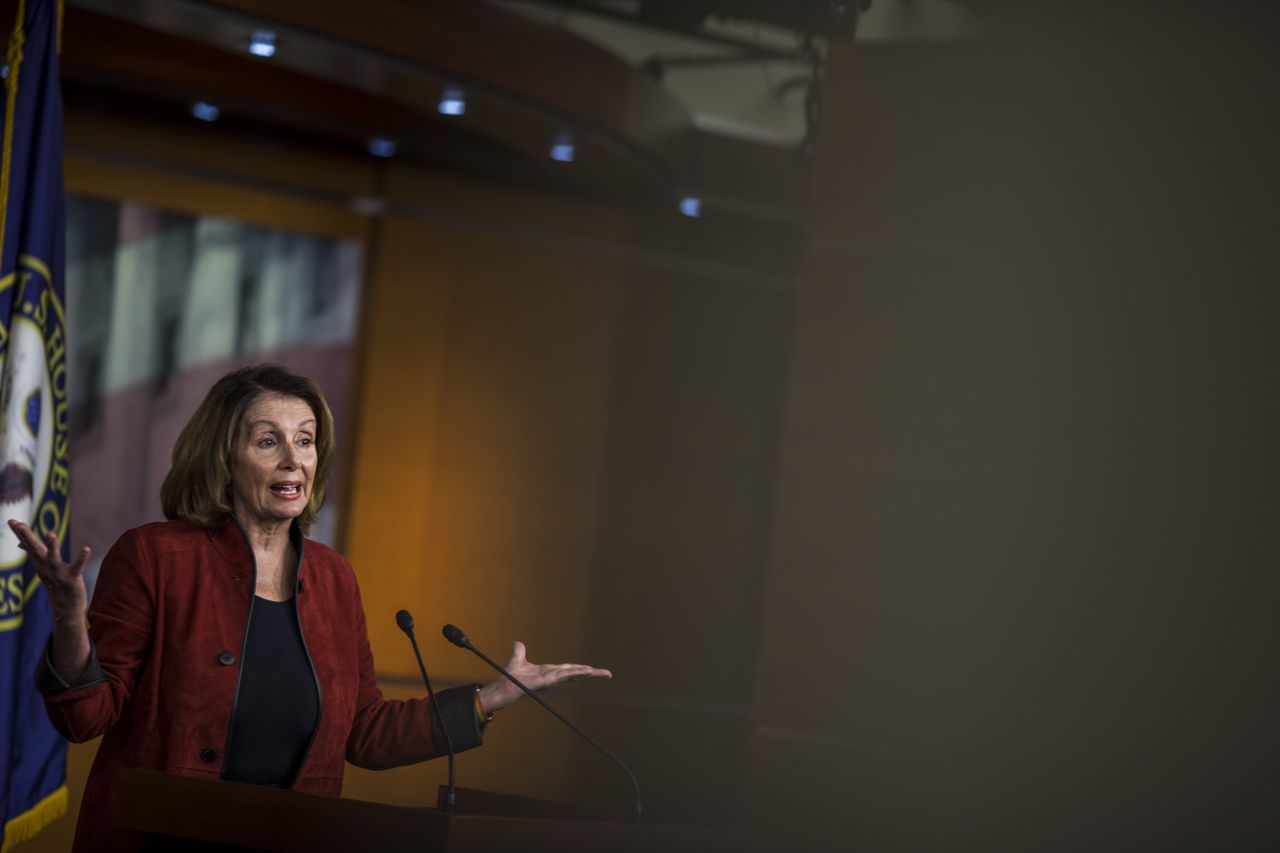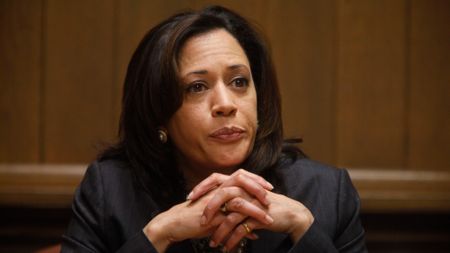Why House Democrats should reject the Senate's new budget deal
Whatever happened to standing firm in one's convictions?


Yesterday afternoon, Senate Democrats and Republicans struck a bipartisan, two-year budget agreement — one that notably excludes a solution for the immigration crisis surrounding recipients of the Deferred Action for Childhood Arrivals (DACA) program, and sets up yet another confrontation next month over immigration. It remains unclear whether this spending agreement can make it through the House of Representatives. House Minority Leader Nancy Pelosi (D-Calif.) has promised not to support the deal unless Republican leadership promises to bring an immigration compromise to the floor.
So as of Thursday morning, nothing is truly settled. The deal features large increases in both military and domestic spending, something sure to rankle individuals in both parties. But President Trump is happy, which probably means that Democrats not only don't understand their own plight but are actively determined to fritter away the massive advantage they've enjoyed over their unpopular adversaries for the last year. If they don't come to their senses soon and renew their heroic fight against the president's agenda, they might find themselves in the minority for the rest of the decade.
First, this deal represents a dramatic turnabout for Senate Minority Leader Chuck Schumer (D-N.Y.) and his Senate allies, who just last month briefly shut down the government over the fate of the DREAMers. Extensive polling suggested voters blamed President Trump and the Republican Congress for the dysfunction, and during the abortive crisis, the president's post-holiday polling bump was erased in a matter of hours. Progressive foot soldiers were fired up and ready to go for a bare-knuckle fight to save the DREAMers. Had party leaders held firm, they might have delivered a crippling blow to the president and the anti-immigrant hardliners who have his ear.
Subscribe to The Week
Escape your echo chamber. Get the facts behind the news, plus analysis from multiple perspectives.

Sign up for The Week's Free Newsletters
From our morning news briefing to a weekly Good News Newsletter, get the best of The Week delivered directly to your inbox.
From our morning news briefing to a weekly Good News Newsletter, get the best of The Week delivered directly to your inbox.
But Democratic leadership mysteriously capitulated, demoralizing activists, granting President Trump a public victory and the right to brag about how he had stared down his opponents just days before he could project his preferred narrative unchallenged to tens of millions of viewers during the State of the Union address. The president's approval rating is now floating up near his high-water mark of 40 percent (dream big, kids!). In retrospect, this sequence of events could not possibly look worse for Democrats.
But what's done is done. Today, Democrats are choosing to trust the good word of Senate Majority Leader Mitch McConnell (R-Ky.), who has earnestly promised to bring an immigration bill to the floor of the Senate as long as Democrats vote to keep the government open. If this is anything like the 2014 re-election night promise to pursue bipartisanship, we should be skeptical. And the tentative deal presents an opportunity for fresh brinksmanship in the House, where party leaders are bitterly disappointed — Democrats by the failure to address the DACA crisis in the spending deal, and hardline Republicans by the growth in domestic federal spending that they had hoped to direct exclusively to the Pentagon or to rich people.
Several significant questions hang over D.C. this morning. First, will House Democrats swallow this deal, trusting Senate Democrats to take a harder line on the immigration standoff in the weeks to come? Where will the leverage come from to extract a favorable immigration compromise from Republicans if it wasn't there three weeks ago or yesterday afternoon? And for Republican fiscal zealots, will they once again allow themselves to be steamrolled by the leadership's desire for compromise and business as usual? The reality of the Trump tax cut math is starting to set in, with The Washington Post reporting that roughly a trillion dollars is expected to be added to the national debt this year due to dramatically reduced federal revenues.
More broadly, Democratic leaders need to seriously rethink their 2018 strategy. Senate elites in particular appear terrified of endangering their most vulnerable incumbents in places like Missouri, North Dakota, and Indiana. Instead of hanging together and doing everything they can to obstruct the Republican agenda, as they did so capably and occasionally inspirationally during year one of President Trump's epic misrule, the party is allowing itself to be fractured by competing and cross-cutting pressures.
Leadership is obviously concerned that red state Democrats will get clobbered by center-right voters for sticking with the progressive priorities of the Democratic caucus as a whole. They seem to believe that by providing the appearance of moderation and compromise with President Trump, they can simultaneously sweep to a substantial House majority while running the table on a very difficult map to nab the Senate. But the way they are operating right now risks losing both chambers with little conceivable upside.
Midterm wins and losses are less a matter of who persuades the independents in each race and more about which party can convince its base to care enough to turn out en masse. Ask red state Democrats how their efforts at moderation turned out in 2010 and 2014, or blue state Republicans how successful they were at distinguishing themselves from President Bush in 2006 and 2008. In today's hyper-polarized environment, candidates will rise and fall with the fortunes of their national party, and those fortunes are largely dependent on how thoroughly the opposition can checkmate the president. Had the country elected a moderate, center-right Republican figure like John Kasich to the office along with sober, responsible GOP majorities in Congress, a Democratic strategy of ruthless obstruction might have been both indefensible and counter-productive.
But that's not what happened. America placed the presidency in the hands of a two-bit grifter knee-deep in Russian gangster cash, and a Republican Congress whose idea of executive oversight is the partisan-driven destruction of already-conservative institutions like the FBI and the CIA. Collectively, this is the most shameless bunch of self-interested, hypocritical institution-wreckers ever to hold total power over the American political system. They cannot be appeased or reasoned with.
A little over a year ago, I argued that Democrats should compromise with President Trump only to achieve specific and incontestable moral victories — to save the millions of Americans who depend on the ObamaCare exchanges, for instance, or to rescue the DREAMers from deportation. Such concessions are worth bending or even breaking on other issues, whether that be funding for the president's juvenile and useless border wall, or lighting another trillion dollars on fire to build the next generation of air force boondoggles.
That's not what Democrats got yesterday. Generalized increases in domestic spending, however laudable in the abstract, are not significant enough victories in the short run to justify the erosion in the Democratic bargaining position, or to grant President Trump the ability to brag about his deal-making skills. The last thing Democrats can afford in this environment is to make it seem like D.C. can function just fine with Republicans in control of Congress and the presidency, and Democrats willing to fold to the slightest raise.
Sign up for Today's Best Articles in your inbox
A free daily email with the biggest news stories of the day – and the best features from TheWeek.com
David Faris is an associate professor of political science at Roosevelt University and the author of It's Time to Fight Dirty: How Democrats Can Build a Lasting Majority in American Politics. He is a frequent contributor to Informed Comment, and his work has appeared in the Chicago Sun-Times, The Christian Science Monitor, and Indy Week.
-
 Today's political cartoons - March 30, 2025
Today's political cartoons - March 30, 2025Cartoons Sunday's cartoons - strawberry fields forever, secret files, and more
By The Week US Published
-
 5 hilariously sparse cartoons about further DOGE cuts
5 hilariously sparse cartoons about further DOGE cutsCartoons Artists take on free audits, report cards, and more
By The Week US Published
-
 Following the Tea Horse Road in China
Following the Tea Horse Road in ChinaThe Week Recommends This network of roads and trails served as vital trading routes
By The Week UK Published
-
 The JFK files: the truth at last?
The JFK files: the truth at last?In The Spotlight More than 64,000 previously classified documents relating the 1963 assassination of John F. Kennedy have been released by the Trump administration
By The Week Staff Published
-
 'Seriously, not literally': how should the world take Donald Trump?
'Seriously, not literally': how should the world take Donald Trump?Today's big question White House rhetoric and reality look likely to become increasingly blurred
By Sorcha Bradley, The Week UK Published
-
 Will Trump's 'madman' strategy pay off?
Will Trump's 'madman' strategy pay off?Today's Big Question Incoming US president likes to seem unpredictable but, this time round, world leaders could be wise to his playbook
By Sorcha Bradley, The Week UK Published
-
 Democrats vs. Republicans: who are the billionaires backing?
Democrats vs. Republicans: who are the billionaires backing?The Explainer Younger tech titans join 'boys' club throwing money and support' behind President Trump, while older plutocrats quietly rebuke new administration
By Harriet Marsden, The Week UK Published
-
 US election: where things stand with one week to go
US election: where things stand with one week to goThe Explainer Harris' lead in the polls has been narrowing in Trump's favour, but her campaign remains 'cautiously optimistic'
By Harriet Marsden, The Week UK Published
-
 Is Trump okay?
Is Trump okay?Today's Big Question Former president's mental fitness and alleged cognitive decline firmly back in the spotlight after 'bizarre' town hall event
By Harriet Marsden, The Week UK Published
-
 The life and times of Kamala Harris
The life and times of Kamala HarrisThe Explainer The vice-president is narrowly leading the race to become the next US president. How did she get to where she is now?
By The Week UK Published
-
 Will 'weirdly civil' VP debate move dial in US election?
Will 'weirdly civil' VP debate move dial in US election?Today's Big Question 'Diametrically opposed' candidates showed 'a lot of commonality' on some issues, but offered competing visions for America's future and democracy
By Harriet Marsden, The Week UK Published
